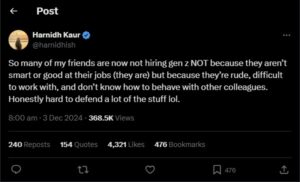A recent social media post has ignited a fiery discussion about the workplace behavior of Gen Z employees. The conversation began when Harnidh Kaur, a prominent writer and commentator, shared her views on X (formerly Twitter), claiming that many employers find Gen Z “rude” and “difficult to work with.”
Kaur’s post resonated widely, leading to a deluge of reactions from across the internet. She explained that her friends, who are employers, hesitate to hire Gen Z workers—not due to a lack of skills or intelligence but because of perceived challenges in workplace interactions.
“So many of my friends are now not hiring Gen Z—not because they aren’t smart or good at their jobs (they are)—but because they’re rude, difficult to work with, and don’t know how to behave with other colleagues. Honestly, it’s hard to defend a lot of it,” she wrote.
The conversation didn’t stop there. Kaur also shared a colleague’s perspective on generational tensions in the workplace: “They Gen Z expect everyone to make space for and care about their feelings, but if you ask them to care about anyone else’s, it’s too much work for them, and they lash out.”
This statement opened the floodgates for a heated online debate, with opinions pouring in from all sides. While some echoed Kaur’s sentiments, others rushed to defend Gen Z, highlighting their unique strengths and values.
Defending Gen Z: Values Beyond Perception
Supporters of Gen Z employees were quick to challenge the narrative, emphasising their positive traits. One user wrote, “Gen Z cares deeply about things our generations didn’t—diversity, mental health, and work-life balance. What some interpret as ‘rude’ might just be their way of asserting these priorities.”
Another pointed out that older generations are not without flaws, arguing, “I can say the same for boomers and millennials who underpay employees, resist change, and expect unquestioned obedience. Gen Z is challenging the status quo, and that’s not a bad thing.”
Indeed, many defended Gen Z’s commitment to creating inclusive workplaces and maintaining boundaries. For them, these traits are often misconstrued as entitlement or arrogance by those accustomed to traditional work norms.
Criticism of Gen Z: Entitlement and Workplace Challenges
However, not everyone shared this view. Critics pointed to what they perceived as a growing sense of entitlement among Gen Z employees. “You missed ‘entitlement,’” one user quipped. “It’s as if they expect the world without putting in the work. Maybe it stems from the Covid era, when they saw people working from home while making Dalgona coffee.”

Another comment underscored this sentiment, saying, “Largely agree. The entitlement is too much, and there’s often little accountability for delivering results.”
These criticisms suggest that for some employers, the clash with Gen Z arises from differing expectations about workplace culture and responsibilities. While previous generations might have conformed to hierarchical norms, Gen Z appears to challenge these norms head-on, often creating friction.
Stereotyping or Generational Reality?
Amid the back-and-forth, many questioned the fairness of generalising an entire generation. “This feels too much like stereotyping,” one user remarked. Others argued that the behavior Kaur described might not be representative of Gen Z as a whole but rather isolated incidents or cultural misunderstandings.
Still, the debate raises important questions about evolving workplace dynamics. As Gen Z enters the workforce in larger numbers, they bring with them fresh perspectives on mental health, equality, and work-life balance. While these priorities are celebrated by some, they can also challenge deeply ingrained workplace traditions.
The Bigger Picture: Bridging Generational Gaps
This discussion highlights the need for greater understanding and adaptability in the workplace. Generational differences are not new, but they’ve become more pronounced in an era of rapid technological and cultural shifts. Bridging these gaps will require effort from both sides—employers and employees alike.
For employers, the challenge lies in creating environments that balance respect for tradition with openness to change. For Gen Z, it means navigating workplace dynamics while staying true to their values. The solution likely lies somewhere in the middle, where mutual respect and communication pave the way for productive collaborations.
As the debate rages on, one thing is clear: the workplace is evolving, and generational differences are just one piece of a much larger puzzle. How these differences are addressed will shape the future of work for years to come.


